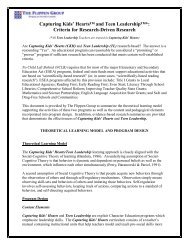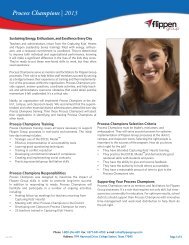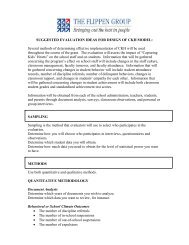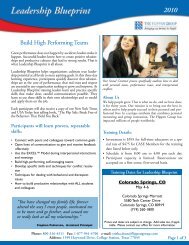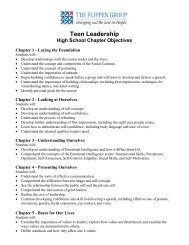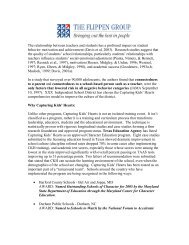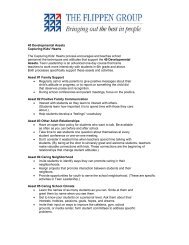Smart & Good High Schools - The Flippen Group
Smart & Good High Schools - The Flippen Group
Smart & Good High Schools - The Flippen Group
- No tags were found...
Create successful ePaper yourself
Turn your PDF publications into a flip-book with our unique Google optimized e-Paper software.
CHAPTER 5: Fostering the 8 Strengths of Character—Outcome 4Young people won’t, of course, apply all these tests toevery moral decision they make. But even if they applyone of them, they’ll make a better decision than if theyacted on impulse or without considered judgment.Teach a Problem-Solving ProcessIn addition to the nine ethical tests, there’s a problemsolvingprocess we can teach young people to use whenthey’re faced with a difficult moral situation where, evenafter applying the ethical tests, the best course of actionisn’t immediately clear. For example, some students atschool are picking on another kid, but you’re afraid thatif you tell an adult, it might just get worse for the victimand maybe the bullies will turn on you. Or, you’re in aconversation where some people are using slurs to referto particular students—how should you respond? Withthese and other difficult moral challenges, the followingsteps can aid decision-making:1. Consider alternatives. What are different ways of tryingto deal with this problem?2. Weigh consequences. What are the likely good and badresults of the different alternatives for the people whowould be affected, including myself?3. Identify the moral values. What moral values areinvolved?4. Seek advice. Who could I ask for help in deciding whatto do in this situation?5. Make a decision. Which course of action does the bestjob of respecting the important moral values and producinggood consequences?Conduct Moral Dilemma DiscussionsIn their 2005 report What Works in Character Education,Berkowitz and Bier state:Moral dilemma discussion has been studied for over threedecades, and numerous meta-analyses of close to 100 studieshave demonstrated its effectiveness in promoting thedevelopment of moral reasoning. When students engage inguided peer discussions of moral dilemmas, they show accelerateddevelopment in moral reasoning capacities. 36Dilemma discussions engage students in considering ordebating different ways to solve difficult, often complexmoral problems. <strong>The</strong>se might be interpersonal dilemmas(e.g., “Your best friend, in danger of failing a course, asksto copy your homework, which violates your school’shonor code. What should you do?” Or, “Your friends havedeveloped a pattern of drinking and driving, which reallyconcerns you. How can you handle this?”); historicaldilemmas (e.g., “Should the United States have droppedthe atomic bomb on Japan?”); or one of the many socialdilemmas that are often hotly contested in the publicarena (“Did the U.S. have sufficient grounds to justify apre-emptive war in Iraq?”; “Who is responsible for—andwho should be punished for—the abuse of prisoners inIraq, Afghanistan, and Guantanamo Bay?”; “Should thelaw protect a woman’s right to abortion as a reproductivefreedom that involves an intimate personal moral decisionabout one’s life, or should the law, as a matter of justice,extend equal protection of the right to live to humanbeings not yet born?”; “Who should have the right todecide whether to remove a feeding tube from a patientwho is severely impaired but not terminally ill?”).When students engage in facilitatedpeer discussions of moral dilemmas,they show accelerated developmentof moral reasoning.Research shows a positive correlation between the developmentof moral reasoning and more moral behaviorsuch as less cheating and less substance abuse. 37 Sincemoral dilemma discussions have the potential to bringabout advances in moral reasoning, we do well to considerwhat makes for the effective use of this tool. We candraw on the research for guidance:◆ Socratic questioning develops students’ moral reasoning.In a year-long study of 32 high school social studiescourses, the teacher’s use of Socratic questioning to drawout and challenge students’ moral reasoning was the onlyteacher behavior differentiating those classes that showedsignificant moral reasoning development from those thatdid not. 38 (See box on page 142 for sample Socratic questionsthat stimulate moral discussion.)◆ Adult leadership matters. Dilemma discussions led byadults produced three times as much moral reasoningdevelopment as ones in which the adult was largely passive.39No one has a right to do what is wrong.—ABRAHAM LINCOLN141<strong>Smart</strong> & <strong>Good</strong> <strong>High</strong> <strong>Schools</strong>




